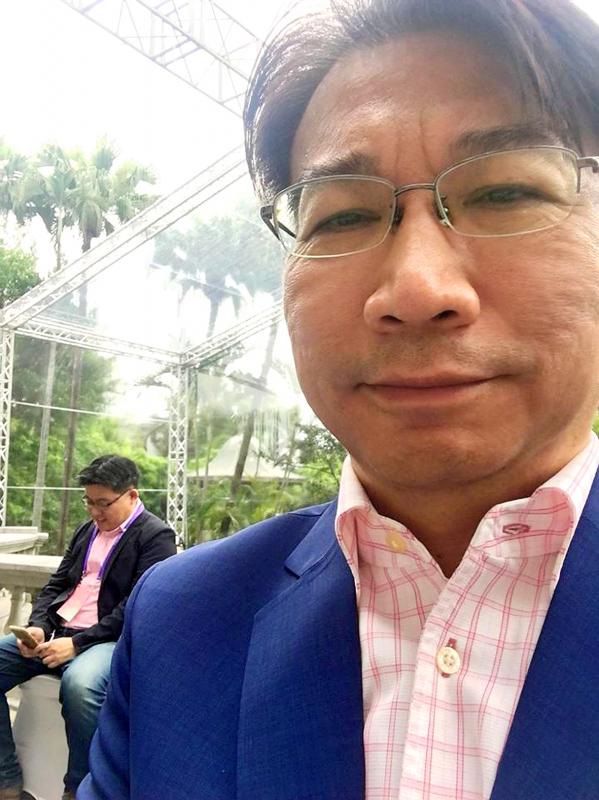Pro-independence political parties yesterday lamented Tsai’s adhering to the “status quo” and the Act Governing Relations Between the People of the Taiwan Area and the Mainland Area (台灣地區與大陸地區人民關係條例) in her second inaugural address.
The Taiwan Statebuilding Party had on Tuesday called on Tsai to avoid emphasizing the act, which refers to an inevitable unification of Taiwan and China.
The Taiwan Statebuilding Party yesterday said it was regrettable that Tsai had maintained her stance on adhering to the act, and said it would press forward with promoting its proposed bill on China relations, which would break the impasse caused by references to inevitable unification.

Photo: Screen grab from Hsu Yung-ming’s Facebook page
“Under the limitations of the current laws and Constitution, how can the administration lead Taiwan in presenting itself as a country? How can it act pre-emptively and reinvent itself?” the party said.
While the party understands the weight of the governing party’s responsibilities, and the limitations it faces, Taiwan should not limit itself at “this important moment for transformation,” it said.
The government should speed up the process of desinicization of Taiwan, it said, adding that the government should “imitate the governments of the US and Japan, and help industry pull out of China.”
Reducing Taiwan’s economic reliance on China is also important to protecting trade secrets and sensitive technologies, it said, adding that the government must better scrutinize those in politics who have significant investments in China.
The government should establish an agency similar to Germany’s Federal Office for the Protection of the Constitution, which would allow independent review of political parties suspected of undermining the nation’s democracy, which should be disbanded, it said.
New Power Party (NPP) Chairman Hsu Yung-ming (徐永明) said he was happy to see Tsai bring up the issue of constitutional amendment during her address.
However, he said he was concerned that in reiterating her administration’s adherence to the “status quo” in cross-strait relations, Taiwan might miss the opportunity to develop its international space amid a shifting international perception during the COVID-19 pandemic.
Hsu and NPP caucus whip Chiu Hsien-chih (邱顯智) wore pink to Tsai’s inauguration ceremony to call attention to what they said is a worsening gender imbalance in the Executive Yuan, with the new Cabinet having fewer female members.
The two NPP members also urged Tsai to move forward with a proposal to lower the voting age to 18, which they said already has wide public support.
Hsu said he had spoken to Democratic Progressive Party caucus convener Ker Chien-ming (柯建銘) at the ceremony, and the two agreed that a constitutional amendment committee should be established.
However, opposition parties would need to be consulted before such a committee could be established, he added.

POSITIVE DEVELOPMENT: Japan and the US are expected to hold in-depth discussions on Taiwan-related issues during the meeting next month, Japanese sources said The holding of a Japan-US leaders’ meeting ahead of US President Donald Trump’s visit to China is positive news for Taiwan, former Japan-Taiwan Exchange Association representative Hiroyasu Izumi said yesterday. After the Liberal Democratic Party’s landslide victory in Japan’s House of Representatives election, Japanese Prime Minister Sanae Takaichi is scheduled to visit the US next month, where she is to meet with Trump ahead of the US president’s planned visit to China from March 31 to April 2 for a meeting with Chinese President Xi Jinping (習近平). Japan and the US are expected to hold in-depth discussions on Taiwan-related issues during the

‘LIKE-MINDED PARTNER’: Tako van Popta said it would be inappropriate to delay signing the deal with Taiwan because of China, adding he would promote the issue Canadian senators have stressed Taiwan’s importance for international trade and expressed enthusiasm for ensuring the Taiwan-Canada trade cooperation framework agreement is implemented this year. Representative to Canada Harry Tseng (曾厚仁) in an interview with the Central News Agency (CNA) said he was increasingly uneasy about Ottawa’s delays in signing the agreement, especially as Ottawa has warmed toward Beijing. There are “no negotiations left. Not only [is it] initialed, we have three versions of the text ready: English, French and Mandarin,” Tseng said. “That tells you how close we are to the final signature.” Tseng said that he hoped Canadian Prime Minister Mark Carney

President William Lai (賴清德) yesterday bestowed one of Taiwan’s highest honors on Saint Vincent and the Grenadines (SVG) Ambassador Andrea Clare Bowman in recognition of her contributions to bilateral ties. “By conferring the Order of Brilliant Star with Grand Cordon on Ambassador Bowman today, I want to sincerely thank her, on behalf of the Taiwanese people, for her outstanding contribution to deepening diplomatic ties between Taiwan and SVG,” Lai said at a ceremony held at the Presidential Office in Taipei. He noted that Bowman became SVG’s first ambassador to Taiwan in 2019 and

A man walks past elementary school artworks at the Taipei Lantern Festival in Ximen District yesterday, the first day of the event. The festival is to run from 5pm to 10pm through March 15.